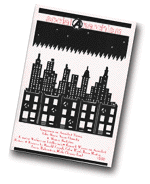A Rebel in Defense of Tradition: The Life and "Politics" of Dwight Macdonald
February 08, 2006
A Rebel in Defense of Tradition: The Life and "Politics" of Dwight Macdonald
by Michael Wreszin. 590 pp. New York: Basic Books, 1994. $30.
by Michael Wreszin. 590 pp. New York: Basic Books, 1994. $30.
Perhaps all truly interesting people are living contradictions. We can certainly offer such a proposal for the life and literary career of the late Dwight Macdonald (1906-1982).
He was, in the astonishingly active course of his life, a snooty Ivy League aesthete (Exeter and Yale, like his father before him), an early writer for Luce's Fortune and Time, a passionate Marxist-Leninist, then a Trot, then a pacifist in World War II, the founder-editor of what many call the most distinguished radical periodical America has had, a supremely tireless activist and street agitator, a staff writer for such slicks as The New Yorker and Esquire while developing a commitment to anarchism, and lastly (but not so lastly) a critic of mass culture while working in the midst of antiwar organizations in the Vietnam War era.
My own memory of Macdonald's work in magazines of the 1950s through the 1970s is that he was simply the best, most witty, close-to-the-bone and generally pissed-off literary journalist and cultural polemicist this nation had. Wreszin writes that Macdonald had "an instinct for the crucial issue," but in his outrage, peevishness, learning, and sweeping stabs at dumbness, pretensions and bad taste, he could also be wickedly funny. It was a heyday of excellent magazine writing for both popular and so-called serious periodicals, yet Macdonald's work was largely unmatched for its sparkle, originality, accuracy of targeting, and general persuasiveness.
Michael Wreszin's full-length biography of Macdonald treats us to the doings of this cleverest of essayists, but also to the contradictions. Macdonald may have been known for his confidence in argument, but his life was frequently one of tortured doubts and depression. No one I can think of lived at the center of greater bustle and social activity (much of it in the nude), but Wreszin presents him feeling often isolated and confused. He changed ideologies the way some people change clothes (Daniel Bell called Macdonald "the floating kidney of the Left"), yet his commitment to his position of the moment was absolute and his sincerity could never be doubted. His role as husband and father seems enviable but he could be most indifferent to his wife and sons who were always puzzled by his emotional remoteness. At the peak of his reputation as a critic he felt the intellectual in American life was utterly unappreciated. Perhaps most troublesome of all, this man with the most fluid of pens never wrote the Big Book he hoped to write. He started major efforts to do studies on dictatorships, the U.S. steel industry, Nazi ideology, and mass culture. These four projects never grew beyond the note-taking stage, though years were devoted to trying to get a start. Of his eleven books, three he only edited (on Herzen, Poe, and the art of parody), and the other eight originated as magazine pieces.
Macdonald has found a good friend in biographer Wreszin, a man who clearly admires his subject. The seemingly negative aspects of Macdonald's life listed above appear to make the writer all the more human and likeable (the nude encounters are hilarious) in the biographer's mind. I love Macdonald's critical essays and reviews but I have always found his several major theoretical pieces of the 1940's—"The Responsibilities of the Peoples" and "The Root is Man"—to be unsatisfactory and missing key arguments even if passionately rendered. But Wreszin makes this phase of Macdonald's personal journey into ever-deepening free-thinking to be believable and necessary as the writer completed the dispelling of the Marxist contagion from his life. A frequent criticism one has often heard of Macdonald over the years is that "he did not become the American Orwell." But the two men have very little resemblance to each other. As much as one may admire the English writer, the image of "Saint George" is out of keeping with the often raffish, heavy-drinking, argumentative, hurricane-like personality presented by Wreszin. They both served their purposes well, and a more apt comparison for Macdonald might be Mark Twain or Chesterton. Frankly, I think Macdonald often wrote better than Orwell.
When the appraisals are all in it is likely that Macdonald's directly political writings will be forgotten, and he will be most appreciated for his ideas on mass culture and his final views on the relevancy of anarchist insight. Beneath the turbulent surface of Macdonald's life as activist and polemicist, there does run a consistent vein of "work devoted to understanding the mass mind and its manipulation by the nation-state," as his biographer notes. Wreszin correctly sees Macdonald as an old-style American individualist and even compares him to Jefferson and Madison in his thinking, as a defender of the Western cultural canon against the onslaught of mass response.
Macdonald's final statement can be found in the speech he repeated whenever possible in his late years, "The Relevance of Anarchism," in which he cited the increasing centralization of power in the state as the chief evil. There is, he said, "too much planning from above and not enough problem solving on the communal level, too much sheeplike respect for authority and not enough man-like respect for one's own interests and values, too much herding together in conformist mediocrity and not enough assertion of those individual differences that make life interesting, too many bureaucrats and demagogues and mother-knows-best bully boys in high office ordering and bamboozling us into political behavior that is disastrous to our own interests." This vision is Dwight Macdonald's real and very generous gift to each of us.
He was, in the astonishingly active course of his life, a snooty Ivy League aesthete (Exeter and Yale, like his father before him), an early writer for Luce's Fortune and Time, a passionate Marxist-Leninist, then a Trot, then a pacifist in World War II, the founder-editor of what many call the most distinguished radical periodical America has had, a supremely tireless activist and street agitator, a staff writer for such slicks as The New Yorker and Esquire while developing a commitment to anarchism, and lastly (but not so lastly) a critic of mass culture while working in the midst of antiwar organizations in the Vietnam War era.
My own memory of Macdonald's work in magazines of the 1950s through the 1970s is that he was simply the best, most witty, close-to-the-bone and generally pissed-off literary journalist and cultural polemicist this nation had. Wreszin writes that Macdonald had "an instinct for the crucial issue," but in his outrage, peevishness, learning, and sweeping stabs at dumbness, pretensions and bad taste, he could also be wickedly funny. It was a heyday of excellent magazine writing for both popular and so-called serious periodicals, yet Macdonald's work was largely unmatched for its sparkle, originality, accuracy of targeting, and general persuasiveness.
Michael Wreszin's full-length biography of Macdonald treats us to the doings of this cleverest of essayists, but also to the contradictions. Macdonald may have been known for his confidence in argument, but his life was frequently one of tortured doubts and depression. No one I can think of lived at the center of greater bustle and social activity (much of it in the nude), but Wreszin presents him feeling often isolated and confused. He changed ideologies the way some people change clothes (Daniel Bell called Macdonald "the floating kidney of the Left"), yet his commitment to his position of the moment was absolute and his sincerity could never be doubted. His role as husband and father seems enviable but he could be most indifferent to his wife and sons who were always puzzled by his emotional remoteness. At the peak of his reputation as a critic he felt the intellectual in American life was utterly unappreciated. Perhaps most troublesome of all, this man with the most fluid of pens never wrote the Big Book he hoped to write. He started major efforts to do studies on dictatorships, the U.S. steel industry, Nazi ideology, and mass culture. These four projects never grew beyond the note-taking stage, though years were devoted to trying to get a start. Of his eleven books, three he only edited (on Herzen, Poe, and the art of parody), and the other eight originated as magazine pieces.
Macdonald has found a good friend in biographer Wreszin, a man who clearly admires his subject. The seemingly negative aspects of Macdonald's life listed above appear to make the writer all the more human and likeable (the nude encounters are hilarious) in the biographer's mind. I love Macdonald's critical essays and reviews but I have always found his several major theoretical pieces of the 1940's—"The Responsibilities of the Peoples" and "The Root is Man"—to be unsatisfactory and missing key arguments even if passionately rendered. But Wreszin makes this phase of Macdonald's personal journey into ever-deepening free-thinking to be believable and necessary as the writer completed the dispelling of the Marxist contagion from his life. A frequent criticism one has often heard of Macdonald over the years is that "he did not become the American Orwell." But the two men have very little resemblance to each other. As much as one may admire the English writer, the image of "Saint George" is out of keeping with the often raffish, heavy-drinking, argumentative, hurricane-like personality presented by Wreszin. They both served their purposes well, and a more apt comparison for Macdonald might be Mark Twain or Chesterton. Frankly, I think Macdonald often wrote better than Orwell.
When the appraisals are all in it is likely that Macdonald's directly political writings will be forgotten, and he will be most appreciated for his ideas on mass culture and his final views on the relevancy of anarchist insight. Beneath the turbulent surface of Macdonald's life as activist and polemicist, there does run a consistent vein of "work devoted to understanding the mass mind and its manipulation by the nation-state," as his biographer notes. Wreszin correctly sees Macdonald as an old-style American individualist and even compares him to Jefferson and Madison in his thinking, as a defender of the Western cultural canon against the onslaught of mass response.
Macdonald's final statement can be found in the speech he repeated whenever possible in his late years, "The Relevance of Anarchism," in which he cited the increasing centralization of power in the state as the chief evil. There is, he said, "too much planning from above and not enough problem solving on the communal level, too much sheeplike respect for authority and not enough man-like respect for one's own interests and values, too much herding together in conformist mediocrity and not enough assertion of those individual differences that make life interesting, too many bureaucrats and demagogues and mother-knows-best bully boys in high office ordering and bamboozling us into political behavior that is disastrous to our own interests." This vision is Dwight Macdonald's real and very generous gift to each of us.

